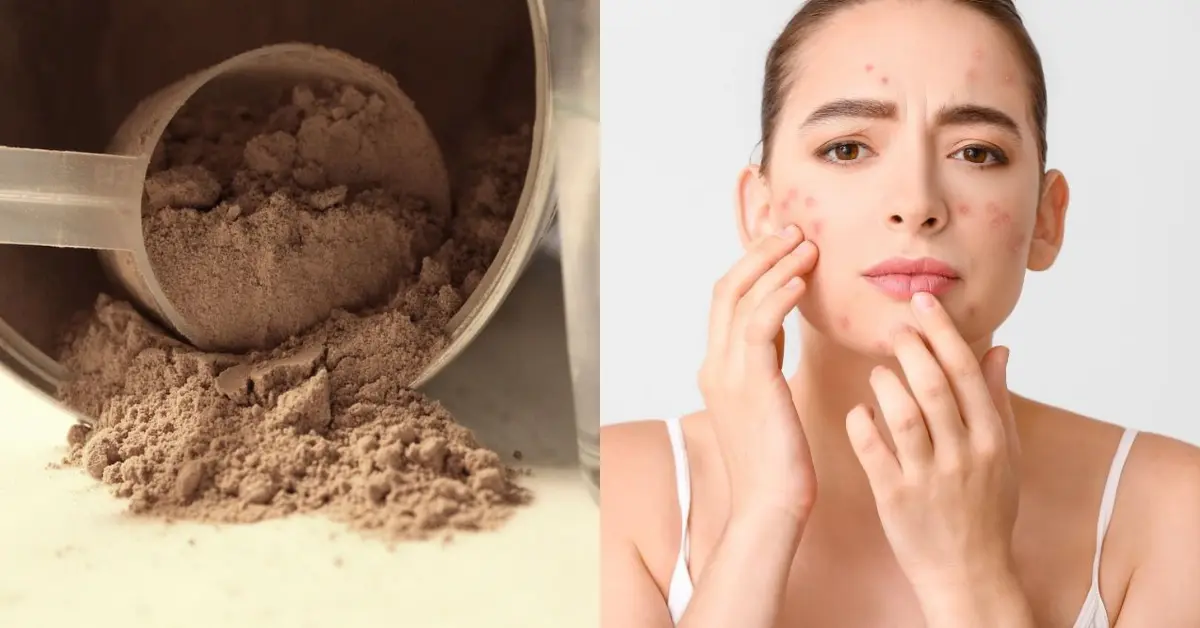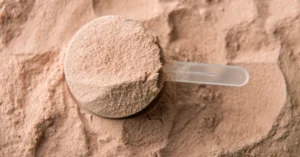Are you facing acne while consuming whey protein? Here, you can find out the real effect of this powder on your skin.
In some individuals, it leads to acne breakouts. However, it is a well-known dietary supplement used by fitness enthusiasts. It also offers numerous health benefits, like muscle growth.
Can protein powder cause acne?
This powder doesn’t directly cause acne, but its consumption may contribute to skin or acne breakouts in some individuals.
Acne can result from increased hormone levels, which certain powders, especially those containing whey or casein, might stimulate due to their dairy-derived nature. Excessive intake can also strain the liver and kidneys. Hence, it potentially impacts your skin health.
Why do people use whey protein?
1. Promotes weight loss
When you eat it in more quantity, it reduces your appetite. Naturally, you end up eating fewer calories. It boosts your metabolism and eventually burns calories. It also helps you maintain your muscle mass while losing weight.
2. Builds muscle strength
High concentrations and essential amino acids influence your muscle strength. Many health professionals admit that it can boost muscle growth faster than other supplements. It also prevents muscle loss, improves stamina, and makes your body feel toned and fit.
3. Controls asthma
It is known to improve immune response among children suffering from asthma. A report established that children suffering from asthma were given 10 grams of whey protein twice daily for at least one month. Soon, their immune responses were showing improvements.
Types of whey protein
You can find the concentrate, hydrolysate, and isolate as the most common types available. You must remember not all have the same impact on acne.
1. Whey protein concentrate
This type contains varying levels of protein, fat, & carbohydrates. You can call it the most common and affordable option. But it contains higher levels of lactose and fat.
2. Whey protein hydrolysate
Hydrolyzed one is predigested that your digestion can easily absorb. It’s often used in infant formulas. You can consume it as it is less likely to cause digestive issues. However, its impact on acne may vary depending on individual sensitivity.
3. Whey protein isolate
This isolate undergoes further processing to remove most lactose and fat. Hence, it results in a higher protein concentration. You should use this type if you have lactose intolerance or acne-prone skin.
Some Acne-Friendly Alternatives
For individuals prone to acne or looking to avoid potential breakouts, there are several alternatives to whey protein:
1. Soy Protein
Phytoestrogens in Soy offer estrogen-like effects on your body. This one could potentially improve acne symptoms.
2. Pea Protein
Derived from yellow split peas. It’s hypoallergenic to consume. You can use it as it is free from lactose and gluten. Suitable for people with acne-prone skin.
3. Egg White Protein
It is derived from egg whites. It offers a high-quality protein source without lactose or fat. It’s rich in essential amino acids and easily digestible.
How to prevent acne from whey protein?
To minimize the risk of getting acne from protein powder, you should choose high-quality, minimally processed powders, stay hydrated, and maintain a balanced diet to support skin health, says Dr Asif.
Here are some ways to reduce acne risk from powder:
- Choose the supplement product wisely
- Read the ingredients carefully
- Avoid high glycemic index diets
- Gradually introduce protein supplements into your diet
- Maintain a good skincare routine
- Keep an eye on your skin
- Consult a dermatologist
Conclusion
While whey protein offers numerous health benefits. You should remember its association with acne breakouts. It underscores the importance of considering individual factors and alternatives. Choosing the right type can help minimize the risk of acne breakouts. You can also try opting for acne-friendly alternatives.


